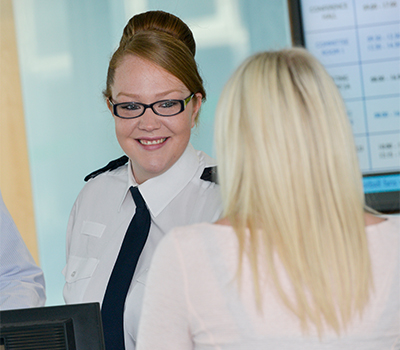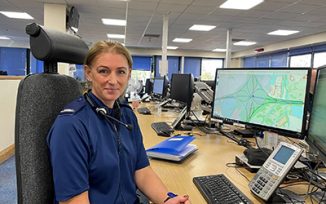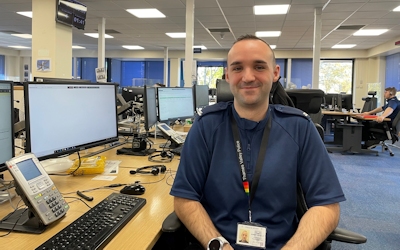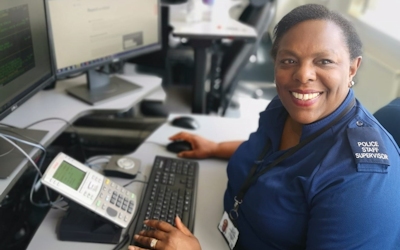Calm in a crisis. Comfort in a victim’s worst moments. A lifeline.
Can you imagine the terror of being chased by someone with a knife? Or being in your car on your usual daily drive, when you’re suddenly upside down in a pile of twisted metal? Now imagine being on the other side. The voice of reason bringing calm to a hysterical parent whose child is missing. Keeping an injured and vulnerable person on the line while you update the control room about what’s happening, reassuring your caller that help is on the way.
We need people who won’t shy away from helping strangers through the worst times of their lives. You’ll need to be kind, and tough. You’ll need to be helpful, and robust. You’ll need bags of empathy, but also the resilience to assess real risk and make quick decisions.
Becoming an Emergency Call Handler
What is the role of a Call Handler?
- Our call handlers are the first point of contact for more than 1,000 emergency and 2,200 non-emergency phone calls every day, as well as hundreds of online interactions. One minute you’ll be taking a calm report from someone who’s seen criminal damage to a park bench, the next you’ll have to deal with someone you can’t understand because they’re just screaming and all you can hear in the background is people fighting.
- If you’re capable of thinking on your feet, staying calm under pressure, making key decisions and communicating with colleagues while you’re still taking information from a caller, we need you. You’ll have to be pretty tough, too. Some calls can be distressing to deal with, and at times you’ll have to put up with being verbally abused while you’re trying to help someone.
- It’s one of the most demanding roles in the modern police force, but one of the most rewarding. You’ll be taking between 30 and 50 calls every shift – where else would you be able to help that many people in a day?
What can we offer you?
Pay
- A full-time, permanent role, for which you will have a starting salary of £33,572.58 per annum/pro rata, which includes the 33.5% shift allowance. This reflects the fact that we operate 24/7, 365 days a year, so please consider this if you normally rely on public transport.
- An Ofsted regulated, nationally recognised professional qualification called the Emergency Service Contact Handler Apprenticeship. That means training in the classroom and on the job. As you progress you will receive ongoing training and development opportunities for the call handling job and beyond for as long as you are with us, whether that’s a few years, or until retirement. And if it’s only a few years until you retire anyway – age is no barrier to apprenticeship these days – you and your life skills and experience will be just as welcome.
Leave
- Staff are provided with 24 days of annual leave, rising to 29 days after five years’ service. Leave can be booked 15 months in advance and for all Contact Management staff it’s done on a self-serve program where you will get an immediate answer if you have been successful or not.
Overtime
- Overtime is often available for those fully qualified in their role during times of operational requirement. For those who work additional hours, either on a rest day of by extending your rostered shift you are rewarded with the option of additional payment or time off in lieu. Enhancements to pay vary.
Shift working
- We’re an emergency service, and that means being available around the clock every day of the year. The basic shift pattern is six on, four off, and includes early shifts, late shifts and night shifts. Night shifts finish at 7am. Late shifts might finish in the evening, late at night or the early hours of the morning, so if you don’t live within walking distance you will need to drive or be driven.
Discover our Full Time Shift Pattern for our 3 control rooms Abingdon, Milton Keynes, Kidlington.
- We need staff who are flexible and able to work a range of early shifts through to night shifts on weekdays, weekends and Bank Holidays. You will be rewarded with a great salary, which includes a shift allowance to reflect the unsocial hours. You will also receive additional enhancements if you do work on a Bank Holiday and there is always the opportunity to work overtime. Our shift pattern is six days on, four days off – it’s a forward rotating pattern where you will (broadly) work two early, two late and two night shifts then have four days off.
- You need to be aware that to provide flexibility in times of changeable call demand, the duties department can move any of your duties by up to three hours – but you will have 13 weeks’ notice.
Flexible and part time working
In addition to the above full time shift pattern, we are currently offering part time shift patterns for a limited number of people only for the Trainee Contact Management Centre role based in Kidlington, Oxfordshire.
- The basic salary is £25,148 for Full Time Equivalent (FTE) patterns, 30 hours a week. (This is based on pay for a 37 hour week. Where the pattern is less than that the pay is reduced for the number of hours worked per week as a part time role). This pattern does not attract an additional shift allowance. A training day (09-15) will be allocated once every 10 weeks.
For more information on the type of part-time shift patterns we can offer, please contact RecruitmentStaffCM@thamesvalley.police.uk
Pension
- TVP offer a Local Government Pension Scheme (LGPS) which you are contractually enrolled in from your date of joining. It is a tax approved, Defined Benefit occupational pension scheme.
The LGPS gives you:
- Secure benefits – the Scheme provides you with a future income, independent of share prices and stock market fluctuations.
- At a low cost to you – with tax efficient savings.
- And your employer pays in too – the Scheme is provided by your employer who meets the balance of the cost of providing your benefits in the LGPS.
You receive tax relief on your pension contributions.
- The LGPS scheme allows you to pay more into your pension to boost your pension benefits. It also gives you the option to pay half your normal contributions, known as the 50-50 sections for the scheme and is designed to help members stay in the scheme when times are financially tough.
- At retirement, when you take your pension, you have the option to exchange part of it for some tax free cash.
What are the benefits?
Police Staff have access to an impressive range of benefits depending on your role and length of service. Apart from an excellent starting salary and 24 days’ annual leave (plus Bank Holidays), increasing by 5 days after 5 years’ service, performance related pay increases, a huge number of lifestyle discounts (many of them through the Blue Light Card, numerous career development opportunities – through promotion or secondment – and the option to join a local government pension scheme). Discover a full list of benefits on our Supporting You page.
Personal support and advice
- Call handlers deal daily with people who are at the end of their tether, at the worst time of their lives. That’s why we make sure there is always support for our staff, whether that’s a debrief from a supervisor or access to a 24/7 independent counselling service. Full support is also available from our Welfare Department or the Occupational Health Unit.
- We believe in investing in all of our people and run tailored Positive Action Initiatives to support our colleagues from underrepresented backgrounds in their personal and professional development, ensuring everyone has a level playing field to succeed, progress and feel fulfilled in their careers.
Sports and Social
- TVP is a big organisation, with more than 7,000 employees in total. There are many opportunities to join in with colleagues in a wide variety of settings, from choirs to football teams, CrossFit to fishing. For £3 a month you can join as many clubs as you wish.
‘Your Reward’
‘Your Reward’ is an initiative to recognise and reward high achievers. The criteria is:
- Exceptional performance – payments can be used to reward exceptional performance on a sustained or one-off basis.
- Project work – awarded to individuals who have carried out a significant piece of project work particularly well or performed outstandingly whilst working within a limited timeframe.
Inspire
- The Inspire team here in Contact Management run the staff tuck shop and frozen meals scheme, using the money raised to fund the monthly Inspire awards. The proceeds from the sales of the chocolates, crisps and the healthy, high-protein meals go toward the vouchers that staff receive in recognition for outstanding work. Everyone can nominate a colleague for an award and the winners are then chosen by Inspire. We aim to acknowledge as wide a variety of good work as possible, with winners being recognised for saving lives, supporting victims and maintaining the highest standards.
What is the eligibility criteria?
To apply for the role you will need to meet our eligibility criteria:
- We need you to be over 18 and have a minimum UK residency period of 12 months (combined) in the last three years. Practically, a minimum of English and Maths GCSE A-C or equivalent are desirable and you need to be able to type accurately at a speed of at least 24 words a minute with 75% accuracy. Computer literacy is essential, but you will be trained from the outset to use our systems.
VETTING
- Everyone who works for Thames Valley Police must maintain high ethical and professional standards and act with the utmost integrity. This is crucial to ensure that the public have confidence in TVP. To that end, we must make sure that people who want to work for us will meet those standards, and not be susceptible to pressure from other people to disclose the often sensitive and always confidential information we deal with.
Vetting – Frequently Asked Questions – TVP Careers
Previous convictions/cautions?
A previous conviction or caution will NOT automatically lead to a vetting refusal. Each case will be looked at individually, taking into consideration elements such as:
- Type and seriousness of the conviction/caution
- Age of the applicant at the time of the conviction/caution
- Time elapsed since the conviction/caution
- Whether it was a single incident or part of a pattern of behaviour
Residency
- You will need a minimum UK residency period of 12 months (combined) in the last three years so that meaningful vetting checks can be carried out in line with national standards. (The term “residency” applies to any time spent in the UK, either living, visiting, traveling or working.) If you’ve lived in any other country for more than 28 days in those three years then you will be asked to provide from that country a certificate of good conduct.
Financial situation
- A poor financial history can mean that you might become susceptible to corruption. If you have had problems in the past, for example not keeping up your payments on a loan, we would want to see evidence that you have put steps in place to manage future payments. Clearance is unlikely though if you have a current CCJ against you or if you’ve been subject to a bankruptcy or Debt Relief Order that has only been satisfied within the last three years.
Declare all your police contact
- If you have had any police contact, convictions or criminal associations then you must declare it on the vetting form. If you leave anything out, or provide false or misleading information, then you are likely to be refused. But don’t worry if the vetting department contacts you directly to discuss any declarations you have made – it’s standard procedure and means that things can be clarified. Speak openly to whoever contacts you.
What training will you receive?
- Initial training is classroom based over five weeks, this is Monday – Friday office hours, you will be learning the basics about the crime/legal knowledge that you will need, how to deal with road traffic incidents, domestic violence, suicidal callers, neighbourhood disputes and even escaped cows. There will be three full sets of shifts where you will be sat side by side with your tutor, followed by one set of being mentored, near your tutor, in total 24 days of comprehensive training support in the Contact Centre itself. Even when you’ve finished tutoring you will have the help of a mentor for another set of shifts. All this is to give you confidence in yourself and supports your work over the coming year as you work towards your qualification (Emergency Contact Handler Apprenticeship Level 3 ) as an apprentice.
- Initial training can take place at any of our three sites, Kidlington, Milton Keynes or Abingdon. You will be paid for your additional mileage over your normal commute to your place of work and travel time allocated to you.
Ongoing training
- You will have a dedicated training day every ten weeks which will be in person or sometimes from home via Teams. We use NCALT, Moodle and College Learn which is on demand training for the policing community.
How can you apply?
We welcome applications from everyone who feels they would be able to do this job, from every demographic and every age group. You don’t need previous experience, but we are looking for common sense, attention to detail, good communication skills, high levels of resilience and a calm head under pressure. Above all, you’ll have the drive and determination to make a difference to the communities we serve.
Please be aware that we are advertising on a rolling recruitment basis, and should you be successful you will be placed into a recruitment pool. Once vetting and medical clearances have been received you will be put into the next available intake.
Key Responsibilities
What you’ll be doing on an average shift:
- Handling emergency and non-emergency calls. Taking control of a call, asking the right questions and recording the information immediately in a log so that radio operators can get it straight to the officers responding.
- Crime Recording – taking reports of crime and recording everything accurately, regardless of whether it’s a stolen wallet or a sexual assault.
- Working with partner agencies such as ambulance, fire, hospitals, and social and mental health services
- Advising callers to contact more appropriate agencies when it’s not a police matter (local council, NHS, Citizens Advice, animal welfare)
- Dealing with reports and queries sent in through our website – these are as important as phone calls
- Staying professional and approachable in the face of sometimes very high call volumes throughout a long shift.
- Staying alert and professional at all times, even – or sometimes especially – at three o’clock in the morning.
If you have any queries please contact our Recruitment Department via RecruitmentStaffCM@thamesvalley.police.uk
Meet our Contact Management Centre Officers (999/101 Call Handlers)
Our Emergency Call Handlers come from all walks of life, and bring a variety of life experiences with them, but what they all have in common is their desire to make a difference and protect our communities. Get inspired by their stories.
Becoming a Police Contact Enquiry Officer (Police Station Front Counters)
What is the role of a Police Contact Enquiry Officer?
In this critical role, you will be the first point of contact for all members of the public visiting the police station.

Dealing with a wide variety of people including victims of crime and offenders, your role will vary from offering support and reassurance to vulnerable people to reasoning and calming emotional, angry and sometimes confrontational visitors.
You will also deal with internal customers, providing a high quality customer service to all.
Attention to detail is key; in accordance with current legislation, policy and procedures you will check and record details in police IT systems. In addition, there will be general administration and the responsibility for dealing with the receipt and return of property.
You will need to be assertive and have the ability to remain calm and think logically in challenging situations. Sensitivity and an appreciation of confidentiality and diversity is equally important.
Eligibility
The eligibility criteria for the role includes the following:
- competent keyboard skills and use of IT systems
- good standard of verbal and written communication
- over the age of 18
Application Process
- online application form
- interview
- provisional offer
- pre-employment checks including medical and vetting
- start date
Apply
Apply here for our Police Contact Enquiry Officer vacancies.




 Facebook
Facebook
 Twitter
Twitter
 Linkedin
Linkedin
 Instagram
Instagram